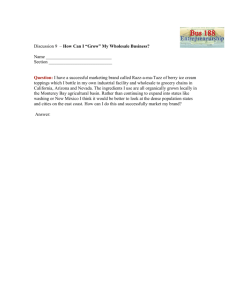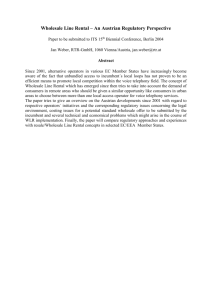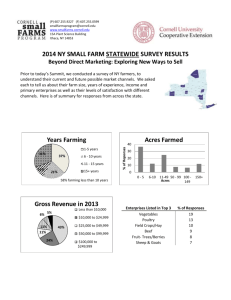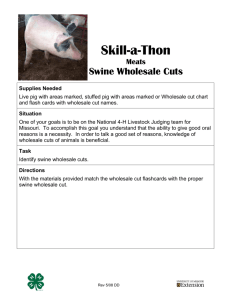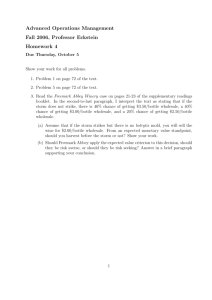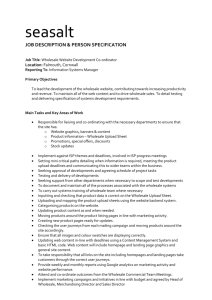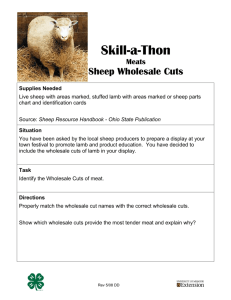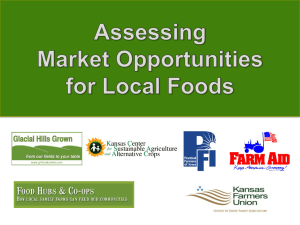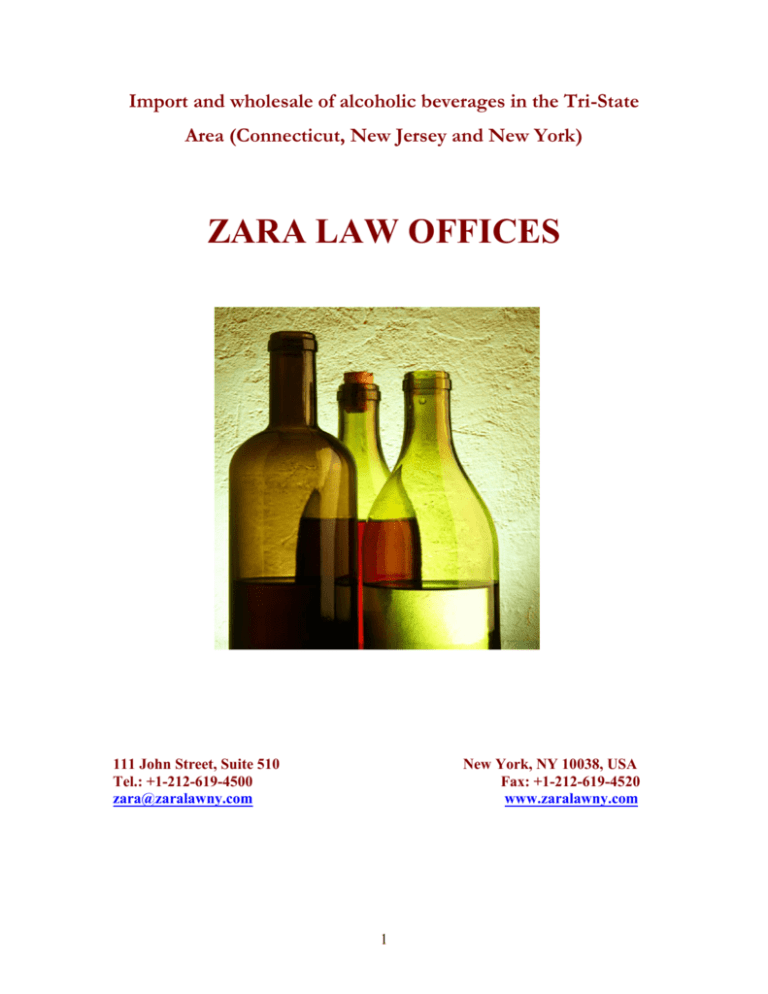
Import and wholesale of alcoholic beverages in the Tri-State
Area (Connecticut, New Jersey and New York)
ZARA LAW OFFICES
111 John Street, Suite 510
Tel.: +1-212-619-4500
zara@zaralawny.com
New York, NY 10038, USA
Fax: +1-212-619-4520
www.zaralawny.com
1
Introduction
The following is intended as a brief guide for wineries, distilleries or other
members of the alcoholic beverage industry, particularly from overseas, that are
interested in setting up an import and wholesale operation in or near New York. While
this guide attempts to outline some of the main issues, other issues may arise depending
on your particular situation. It is not intended as a substitute for specific legal advice.
1. Why choose the Tri-State area for your wholesale business?
The term “Tri-State Area” is commonly used to refer to the New York
metropolitan area. It encompasses New York City and the surrounding cities, towns and
suburbs in the states of New Jersey, New York, and Connecticut that are within
commuting distance of New York City. With more than 18 million residents, it is the
most populous area in the United States and home to a large number of affluent
consumers.
The Tri-State Area is situated closely to the largest port complex on the East
Coast of the country, the Port of New York/ New Jersey. The area is served by three (3)
major and several minor airports and numerous highways and interstates. In contrast to
most other areas in the United States, it also has an extensive public transportation
system.
Overall, the Tri-State Area is an attractive option for establishing your alcohol
wholesale business.
2. “Three-tier” system, “tied-house” prohibition – the intricacies of alcohol
distribution in the United States
In the United States, the distribution and sale of alcoholic beverages is strictly
regulated. While some laws and regulations exist at the Federal level (see part B. below),
2
the U.S. Constitution endows the fifty (50) states with power to regulate most issues
related to the distribution and sale of alcohol in their respective territories.
The laws enacted in different states vary significantly but nearly every state
operates a form of the so-called “three-tier system.” Essentially, this refers to a system of
alcohol distribution in which the
producer of alcohol (the first tier)
sells wine to a distributor (the
second tier) who then sells wine to
a retailer, for example a liquor
store or restaurant (the third tier).
The states have devised their own
licensing systems for these
different levels of industry members. In general, each stakeholder has to be licensed in
the state it operates and is limited to contracting with licensees in its home state. For
example, a retailer licensed as such in New York is obligated by law to purchase products
exclusively from New York-licensed wholesalers.
The term “tied-house” refers to the prohibition that alcoholic beverage industry
members such as manufacturers, wholesalers or importers of alcoholic beverages may not
have ties to retailers. For example, they may not have own any interest in a retailer,
require a retailer to take a certain quota of products or induce retailers to purchase their
products exclusively. While Federal law, as well as some state laws, contains tied-house
provisions, there are certain conditions under which the ban would not apply. It is
imperative that you structure your business in a way that does not violate any tied-house
laws on either the Federal level or the states in which you are intending to operate.
3
Regulation of alcohol distribution at the federal level
1. The TTB
The main federal law regulating importation, distribution and sale of wine on the
federal level is the Federal Alcohol Administration Act (FAA). The FAA provides that “it
shall be unlawful, except pursuant to a
basic permit issued by the Secretary
of the Treasury, to engage in the
business of importing, wholesaling,
blending, or rectifying alcohol
beverages, or producing distilled
spirits or wine in the United States.”
The FAA Act and implementing
regulations set forth the standards for issuing a Basic Permit. They are administered by
the Alcohol and Tobacco Tax and Trade Bureau (TTB), an agency that is an arm of the
US Department of the Treasury.
2. The Basic Permit
Importers seeking to import alcoholic beverages into the United States and
subsequently distribute it to wholesalers and retailers must apply with the TTB for a
Federal Basic Importer’s Permit (hereinafter “Basic Permit”).
Please note that on the Federal level, you only need an additional wholesaler’s
permit if you are planning to sell products other than the ones you plan to import. In any
event, applying for a wholesaler’s permit can be accomplished by combining both the
import and wholesale parts into the same application for a Basic Permit. At this time, no
fee is charged by the TTB for the Basic Permit application.
4
There is no requirement that applicants for a Basic Permit be U.S. citizens or
permanent residents (i.e. Green card holders). However, a background check is done for
individuals listed on the application (for example, the officers and directors if the
applicant is a corporation or the members if the applicant is an LLC, as well as any other
nominee). In the case of foreigners or persons who have lived abroad for the past ten (10)
years, or who have otherwise ties to a foreign country, such background check may
involve Interpol’s records and take considerably longer. The primary contact person on
the part of the applicant will be contacted by the TTB for a telephone interview.
Along with their Basic Permit application, Importers are required to submit a
copy of the contract they have with their foreign supplier, or a Letter of Intent from such
foreign supplier, covering the products the importer intends to bring to the United States.
Please note that as an Importer, you will need to maintain a physical office in the
United States. It is strongly recommended that the premises be an actual professional
office with someone present during normal business hours (Monday through Friday from
9AM to 5PM), as the TTB has the right to conduct inspections of the premises and
records during such times.
While applying for and obtaining the Basic Permit does not carry any filing fees,
once you are importing alcoholic beverages into the United States, you are liable for
paying the Federal Excise taxes levied on such products.
Obtaining a “Certificate of Label Approval” (COLA) for your products
Before an alcohol product can be imported to the U.S., its label needs to be
approved by the TTB. A Certificate of Label Approval or COLA authorizes the
certificate holder to bottle or import alcohol beverages that bear labels identical to those
shown on the certificate.
5
Please note you may apply for label approval only after you have been issued a
Basic Permit by the TTB. COLA applications may be submitted online through the
TTB’s online system after obtaining account access. There is no fee to apply for label
approval.
Under certain circumstances, an importer can obtain a temporary COLA waiver
for product samples shipped by its supplier. If approved, such samples can then be
imported without COLA. For a number of
products, TTB requires a pre-COLA
product evaluation and approval. The
purpose of the evaluation is to determine
whether a proposed label adequately
identifies the product contained in the
bottle. If your product is subject to preCOLA evaluation, the type of pre-COLA product evaluation required depends on that
product’s formulation and origin.
After the pre-COLA product evaluation is completed, you must include a copy of
the pre-COLA product evaluation when submitting your COLA application for such
product.
Setting up a wholesale operation at the state level
1. Incorporating your business
We recommend incorporating a business entity in the U.S. state in which you
want to start your wholesale business. Generally, we do not recommend that a foreign
company simply register and obtain authority to do business in the state. While this is
possible in many U.S. states, registering your foreign company here would expose it to
lawsuits in the U.S.
6
By the same token, we usually do not recommend operating as a sole proprietor,
mainly for tax and liability reasons.
Choosing the right form of entity for your business
While deciding on the legal form of your company depends on your particular
situation and business plan, the Limited Liability Company (LLC) is usually
recommended as a reasonable option for our foreign clients interested in import and
wholesale of alcoholic beverages.
When compared to a corporation, choosing an LLC allows for a management
structure that is somewhat more flexible and tailored to the current needs of the business.
Moreover, the LLC is appealing because double taxation for its owners (they are
called members) can be avoided. The profits and losses of an LLC can be “passed
through” to its members, and thus only reflected on their respective personal tax returns.
Basic Requirements
For starters, a company must obtain an Employer Identification Number (EIN)
from the Federal tax authorities, the Internal Revenue Service (IRS). This serves as the
entity’s identification for tax purposes.
In connection with the application for a Basic Permit, it is important to point out
that an EIN is necessary to complete the application. Therefore, it will need to be
obtained before the Basic Permit application can be submitted to the TTB. The same is
true for wholesale applications in the three states.
To apply for the EIN, a form by the name of SS4 has to completed. Please note
the IRS will issue an EIN to an LLC whose members do not possess a US Social Security
Number. Each of the LLC's members that do not have a Social Security Number and are
7
not eligible to obtain one, at the time the company files its tax return, will instead need to
obtain an Individual Taxpayer Identification Number (ITIN). Please note that an ITIN is
issued for tax processing purposes only; an ITIN does not confer any immigration status
or authority to work in the U.S. on a specific individual.
New York publication requirement for Limited Liability Companies
Pursuant to New York’s LLC law, an LLC is obligated within 120 days of its
formation to publish a Notice of Formation for six (6) consecutive weeks. The
publication must be made in newspapers designated by the County Clerk and must
otherwise comply with certain statutory requirements. It does not need to be completed
before the LLC starts its operations. However, if an LLC does not comply with the
publication requirement, the New York Department of State can suspend it from
conducting business in the state. Please note the publication requirement also applies to a
foreign LLC (i.e. an LLC incorporated in another state or country) that registers for
authority to do business in New York.
The cost of the publication and the necessary filings varies from county to county,
but can run as high as $1,800 (exclusive of legal fees). If you have decided to operate as
an LLC, but are undecided as to the location for your wholesale business, the publication
requirement in New York is certainly a factor to be considered.
2. Alcohol wholesale licensing in Connecticut, New Jersey and New York
The following outlines the main requirements applicable to wholesale licenses in
each of the three (3) states. Please be aware that distinctions may exist with respect to the
different groups of alcohol, i.e. beer, wine and liquor. For a first comparison, you may
wish to consult the respective chart we have compiled for wholesale of beer, wine and
liquor and that are available on our website’s alcoholic beverages section.
8
In the Tri-State Area, the state authorities in charge of enforcing state alcoholic
beverage laws (ABC laws) and issuing licenses related to the production and sale of
alcohol in their respective territories are: The New Jersey Department of Alcoholic
Beverage Control (NJDABC), the New York State Liquor Authority (NYSLA), and the
Connecticut State Department of Consumer Protection Liquor Division (LCD).
Types of licenses available
In Connecticut, a wholesale liquor permit allows the licensee to distribute and sell
wine and liquor. A separate wholesale permit for beer only is also available. All
Connecticut wholesale licenses are valid for one (1) year.
In New Jersey, the following licenses are available at the wholesaler level:
Limited Wholesale License (allows the holder to wholesale beer as well as naturally
fermented wines); Wine Wholesale License (allows the holder to wholesale all types of
wine); Plenary Wholesale License (allows the holder to wholesale liquor as well as all
types of wine). These licenses are all valid for one (1) year.
In New York, separate wholesale licenses are available for the distribution of
beer, wine and liquor. While beer and wine wholesale licenses are valid for one year,
liquor wholesale licenses are issued for three (3) years.
General requirements for obtaining wholesale licenses
The citizenship or residency requirements for alcohol wholesalers imposed by
state laws are among the most significant issues facing foreign business owners in the
alcohol industry.
Connecticut has no requirements regarding the citizenship or residence status of
the individuals listed on the wholesale permit application. Despite the lack of such
9
requirements under Connecticut’s alcoholic beverage regulations, it follows from Federal
Immigration law that any individual working for your wholesale operation must be
properly authorized to work in the United States.
In New Jersey, U.S. citizenship or permanent residency is only mandated for the
principal of a company. In the case of a corporation, this means that only one officer must
be a U.S. citizen or U.S. permanent resident. For an LLC, it is the managing member who
must fulfill this requirement.
Among the three (3) states in the Tri-State Area, New York has the strictest
citizenship/ residency regulations for
alcohol wholesale applicants. In the case
of a corporation, all its officers, as well as
the majority of shareholders that represent
the majority of shares in the corporation,
are required to be U.S. citizens or
permanent residents. Similarly, the
managing member(s) of an LLC must qualify as U.S. citizens or permanent residents, and
the majority of the LLC’s membership interest must be held by U.S. citizens or
permanent residents.
In addition, the New York wholesale application lets applicants provide a “Proof
of Citizenship”, which requires that an attorney admitted in New York compare the
original of an immigration document with the copy annexed to the wholesale application
and affirm the copy’s authenticity.
Notwithstanding the foregoing, any individual who will be engaged in work for
your wholesale company must have a valid visa allowing such person to work in the
United States. It is strongly recommended to obtain immigration law advice regarding
your plans to employ foreign individuals.
10
Other important requirements concern personal history (such as past and presents
residences and employment; criminal convictions) and financial information to be
disclosed by all individuals listed on the application. To some extent or another, such
disclosure requirements, usually in the form of a personal questionnaire, exist on the
application forms of all three (3) states.
State liquor authorities are also concerned about the funds for the intended
wholesale business. Applicants are generally required to list the anticipated expenses or
investment, and may be required to account for the sources of such funds (i.e. checking
accounts; loans).
Special considerations
It is important to point out that a wholesale license from a certain state allows the
holder only to sell to retailers or other wholesalers in that same state. Under certain
circumstances, a wholesaler may qualify in another state as an out-of-state shipper,
allowing such out-of-state wholesaler to sell to a licensed wholesaler in that state.
For example, a New Jersey wholesaler may be able to obtain a permit from the
New York State Liquor Authority to be able to sell to New York licensed wholesalers,
thereby gaining access to a larger market (however, such New Jersey wholesaler could
not sell to retailers in New York).
Compared to New York and New Jersey’s large jointly-run port complex (the Port
of New York/ New Jersey), the state of Connecticut only has smaller cargo ports.
Importers and wholesalers based in Connecticut may need to transport merchandise that
arrives at the Port of New York/New Jersey to Connecticut. This requires an out-of-state
shipper’s permit from Connecticut’s Liquor Control Division, together with any permits
required by the liquor authority of the state of arrival (New Jersey or New York) for the
transport of the alcoholic products through that state.
11
Requirements pertaining to wholesaler premises
It is important that the location from which to operate the wholesale business be
selected as early as possible. All three (3) states mandate that sketches and/or
photographs of the premises be submitted along with the application. Other details about
the premises may also have to be provided. For example, New York requires the landlord
to be identified on a certain form.
Further, license applications are generally subject to compliance with local zoning
regulations, a fact which may require a
written confirmation thereof by the
respective zoning authority (this is for
instance required in Connecticut’s
wholesale permit application form). As a
basic requirement pertaining to wholesaler
premises, all three (3) states’ laws require a
wholesaler to maintain a location in their
state (in New Jersey, only a warehouse location is required). In Connecticut and New
York, the premises may only be used for the wholesale operation, i.e. no other business
may be conducted from those same premises.
Timing of the applications
Another factor to consider for applicants may be the order in which to submit the
applications for the Basic Permit with the TTB and the respective state wholesale
application.
In Connecticut and New Jersey, you may apply for the respective wholesale
license concurrently with your application for a Basic Permit. However, these two (2)
states will only grant wholesale licenses once applicants have obtained a Basic Permit.
12
In New York on the other hand, you are generally required to obtain the Basic
Permit before you can apply for the wholesale license. If in fact the approval of the Basic
Permit is pending, you may submit a New York wholesaler application and indicate “P”
(pending) where asked for the number associated with the Basic Permit.
Fees and costs
The initial fee for a wholesale permit for liquor and wine from the Connecticut
Liquor Control Division, renewable annually, is $2,650.00, plus a $100.00 nonrefundable
application fee. A wholesale permit for beer only is $1,000.00
per year, plus a $100.00
nonrefundable application fee. An out-of state shipper’s permit (necessary to obtain if
imported products arrive in another state, but are to be sold at wholesale in Connecticut,
see above) is respectively $90.00 for beer and wine and $1,250.00 for liquor when issued
to a Connecticut wholesaler, plus the nonrefundable $100.00 application fee. Finally,
Connecticut requires alcohol wholesalers to publish notices of their license in certain
local publications, which will add additional cost to the licensing process.
Since New Jersey has different levels of wholesale licenses (see above), New
Jersey Department of Alcoholic Beverage Control's fees depend on the type of license to
be obtained. Their yearly fees are as follows: $1,875 for a Limited Wholesale License,
$3,750 for a Wine Wholesale License and $8,750 for a Plenary Wholesale License. If an
application is denied, 90% of the submitted fee will be refunded.
In New York, the New York State Liquor Authority 's wholesale license fees per
year are as follows (all including a $400 non-refundable processing fee): $1,520.00 for
wine wholesale, $1,500.for beer wholesale, and $27,280.00 for liquor wholesale.
In addition, all types of wholesale licenses in the three (3) states require that the
applicant obtain a surety bond to be posted by an appropriate surety company (please see
charts for the respective amounts). The purpose of the bond is to insure that all taxes,
fines and penalties that may be due or imposed will be paid to the state.
13
Premiums charged by surety companies are typically a low percentage of the bond
amount, but will be significantly higher if a high-risk bond has to be posted due to bad
credit or the applicant's poor financial history.
Finally, please see the charts for brand registration requirements which add
additional fees, depending on the state and the kind of product.
3. Staying in compliance with the law
While operating their business, wholesalers are required to comply with the
applicable ABC law and regulations. It is also advisable for wholesalers to pay attention
to rulings on particular issues by their respective state liquor authority.
Wholesalers in Connecticut and New Jersey and New York have to register each
product that they are planning to sell as a brand. In New York, brand registration is only
required for beer and liquor products, but not for wine.
Another important obligation for wholesalers consists of monthly price postings.
The background for the price postings is that ABC laws make it illegal to sell or purchase
alcoholic beverages unless the prices of every such product have been filed with the
liquor authority of that state. Every month, in accordance with certain deadlines set by the
state authorities, wholesalers have to file the prices they charge to retailers for every
product they offer with the liquor authority.
The states of Connecticut and New Jersey require price postings for beer, wine
and liquor products. New York’s ABC law exempts beer sold at wholesale from the price
posting requirement, but prices have to be filed with the NYSLA for liquor and wine sold
at wholesale in New York.
14
Finally, wholesalers have to be aware not to run afoul of any tied-house
prohibitions (see above). Violations can
consist of maintaining any forbidden relation
with an alcohol retailer, for example by
extending credit to a retailer beyond the
normal credit period, or inducing a retailer to
take certain quantities of a product.
This Guide was prepared by Zara Law Offices, 111 John Street, Suite 510, New York, NY 10038;
all proprietary or other rights in this Guide belong exclusively to Zara Law Offices. The
unauthorized reproduction or dissemination of any part thereof without specific prior written
consent is prohibited. © Zara Law Offices 2009. All rights reserved.
15

